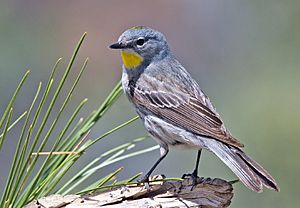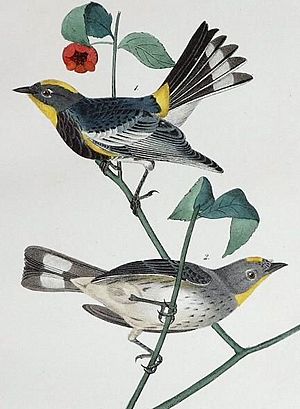Audubon's warbler facts for kids
Quick facts for kids Audubon's warbler |
|
|---|---|
 |
|
| Scientific classification |
|
| Kingdom: | Animalia |
| Phylum: | Chordata |
| Class: | Aves |
| Order: | Passeriformes |
| Family: | Parulidae |
| Genus: | Setophaga |
| Species: | |
| Subspecies: |
S. c. auduboni
|
| Trinomial name | |
| Setophaga coronata auduboni (Townsend, 1837)
|
|
| Synonyms | |
|
|

The Audubon's warbler (Setophaga auduboni) is a small, colorful bird. It belongs to a group of birds called New World warblers. These birds are known for their bright feathers and lively songs.
For a long time, scientists knew that the Audubon's warbler was very similar to another bird, the myrtle warbler. The myrtle warbler lives in eastern North America. Sometimes, these two birds were thought to be different species. Other times, they were grouped together as one species, the yellow-rumped warbler.
Scientists believe these two types of warblers became different during the last ice age. The large ice sheets separated the bird populations. This caused them to evolve slightly differently over time. Later, in 1973, scientists found a place in western Canada where the two types of warblers were mixing. They were having babies together. This showed that they were indeed the same species. So, they were officially grouped as one species: the yellow-rumped warbler.
Where Do They Live?
Audubon's warblers live mostly in western North America. They breed in many parts of western Canada and the western United States. Their home range also extends into Mexico.
These birds are migratory. This means they travel long distances each year. They spend their summers in the northern parts of their breeding range. When winter comes, they fly south. They spend the colder months in the southern parts of their breeding range, all the way into western Central America.
What Do They Look Like?
Audubon's warblers are easy to spot because of their bright colors.
- Summer Male: The male bird in summer has a slate blue back. It has bright yellow patches on its head (crown), rump (lower back), and sides. Its tail has white patches. The chest has black streaks, which look like stripes.
- Female: The female bird has a similar pattern. However, her back is brown instead of blue. Her chest streaks are also brown.
One way to tell an Audubon's warbler from a myrtle warbler is by its throat. The Audubon's warbler has a yellow throat. It also has a yellow patch on its cheek. The myrtle warbler, on the other hand, usually has a whitish stripe above its eye.
Home and Food
Audubon's warblers like to live in forests. They prefer places with conifer trees, like pines and firs. They also live in mixed woodlands, where there are both conifer and other types of trees.
These birds build their nests in trees. Their nest is shaped like a cup. The female bird lays four or five eggs in this nest.
Audubon's warblers mainly eat insects. They are very good at catching them. But when winter arrives, insects are harder to find. So, these birds will also eat berries. In winter, they often gather in small groups to find food.
Their Song
The song of the Audubon's warbler is quite simple. It sounds like a soft trill. A trill is a rapid, vibrating sound. When they want to call out, they make a short, hard sound. It sounds like "check."
Gallery
- New World Warblers by Curson, Quinn and Beadle, ISBN: 0-7136-3932-6
See also
 In Spanish: Reinita de Audubon para niños
In Spanish: Reinita de Audubon para niños
 | Charles R. Drew |
 | Benjamin Banneker |
 | Jane C. Wright |
 | Roger Arliner Young |



